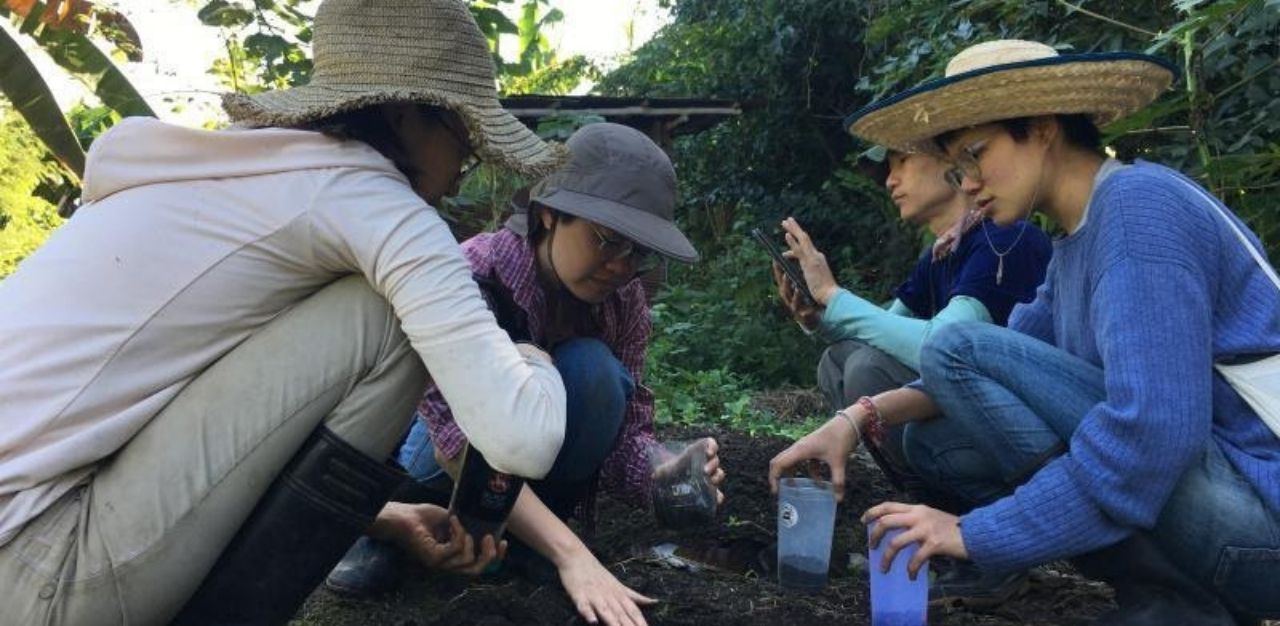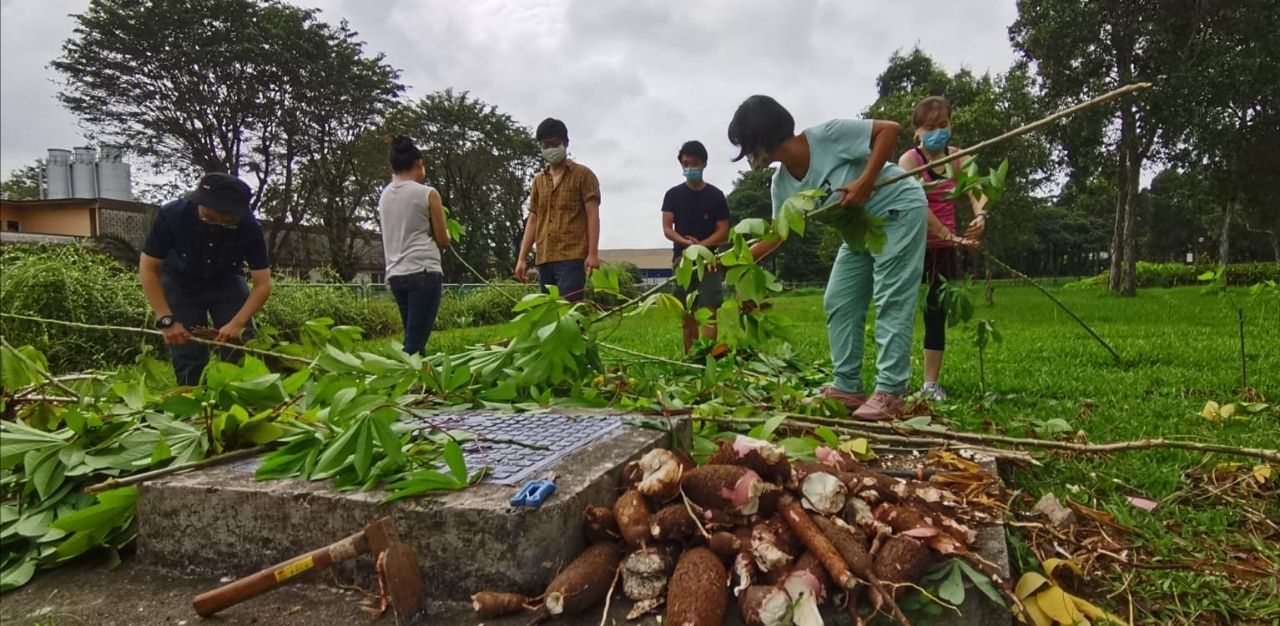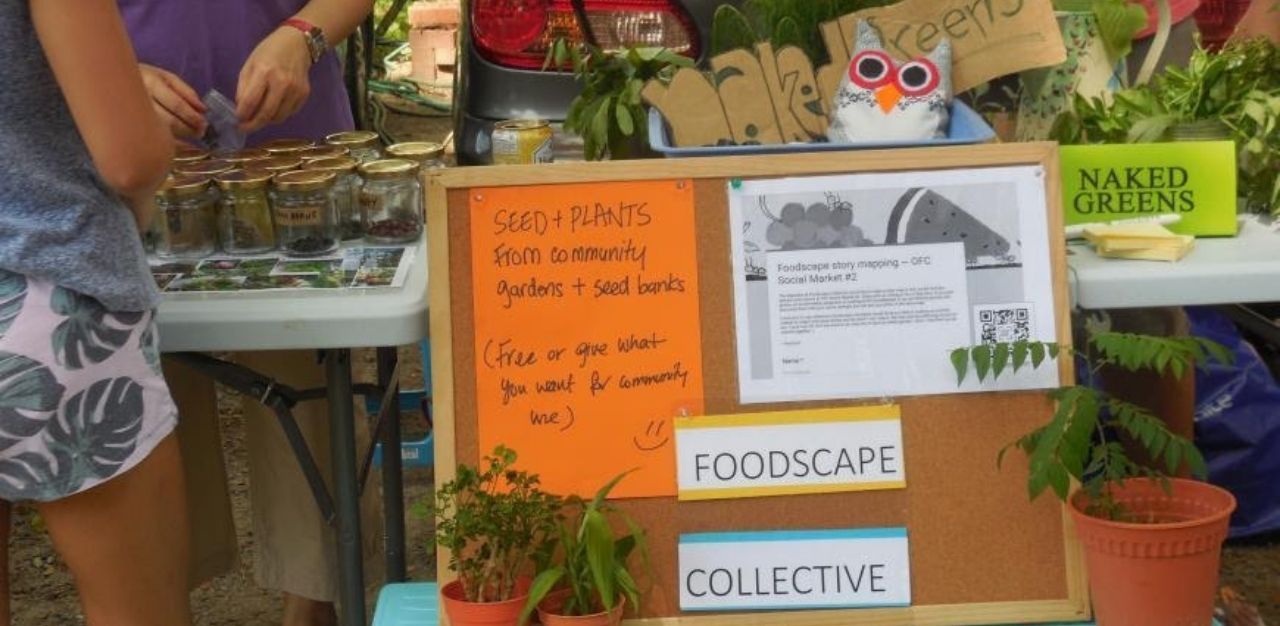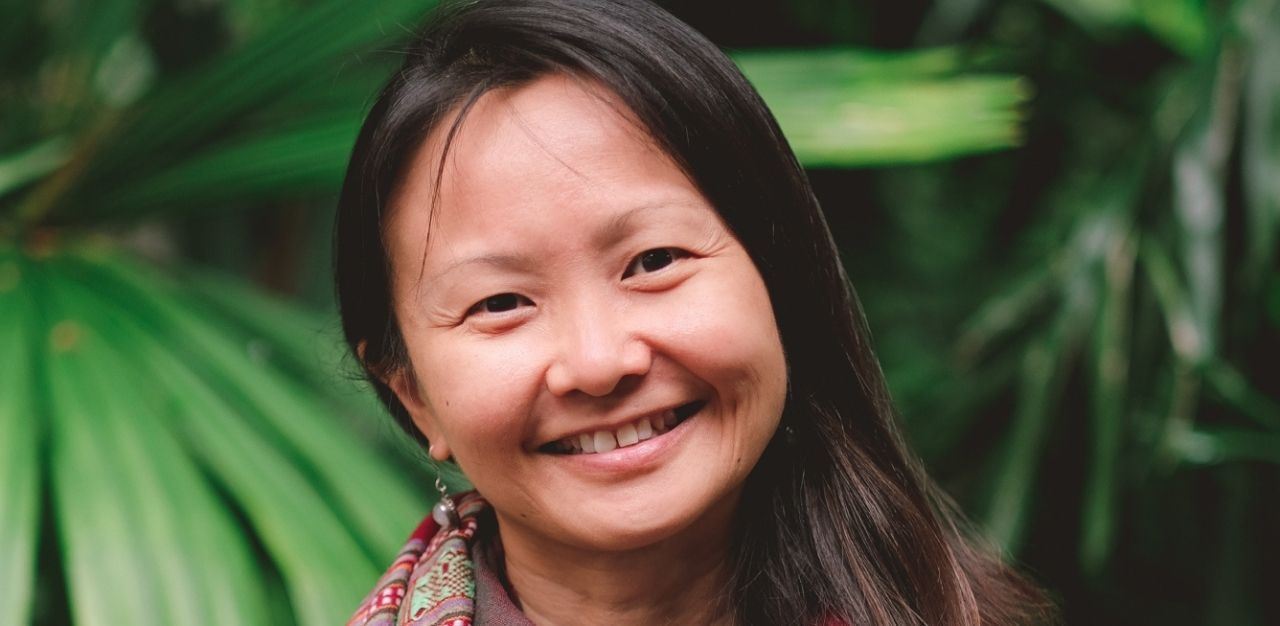It all began when trauma-informed relational somatic touch therapist Vivian Lee, 43, started paying more attention to her own health after eating out frequently in a foreign country.
While studying for her masters of fine arts in photography and video in New York, she took up yoga to maintain her health and that got her thinking about how she could improve her diet to complement the results from her yoga practice. At the same time, she realised that more research is needed on the types of food we eat to stay healthy. Ms Lee was able to grasp that food sold on the busy city streets is not ideal. She also spoke to the farmers at the many farmer’s markets there to understand why they grow what they grow. That was how the idea of cultivating her own food was born.
Ms Lee, who is also a social artist and a mindful eating facilitator, says her different interests seem unrelated “but they are all earthworks – they are all related to regeneration and healing”.
It is no wonder she is involved in projects related to that, and one of which she is currently into, in partnership with the National Parks Board, is the Soil Regeneration Project, a community-led action research and education venture. “What we eat is related to how we treat the soil. If we tend to the soil and encourage its health in a respectful way that creates biodiversity, the food that is grown there will be nutrient-packed and complex. This, in turn, leads to more health benefits for us and the larger ecosystem. It is a win-win,” she says.
TheHomeGround Asia (THG): Having grown up in a city with all the modern amenities, how did you become interested in farming?
Vivian Lee (VL): It was really about a connection to health and understanding that biodiversity is important for wellbeing — be it personal or ecosystem health. I developed an interest in yoga while doing my masters in New York, and I started to pay more attention to my own health. After researching the food that I ate there and speaking to the farmers, I realised that a lot of food we eat is processed or comes from questionable sources. We have no idea what we are putting into our bodies. That was when I wanted to grow my own food. I also found out that the gut microbiome is important and people take kombucha to feed the biodiversity in their guts to increase beneficial gut flora. If the food you eat doesn’t have that complexity, your immunity is not strong. You are what you eat, and you are what your food eats. That’s how I got interested in growing my own food.
THG: Could you share more about the story behind Foodscape Collective and how you became the current guardian and community elder of the collective?
VL: After leaving the US, I travelled for over a year to volunteer in different community and small scale vegetable farms. When I returned to Singapore in August 2015, I wanted to grow my own food and build my own shelter. I actively sought people who share the same interests. So, I volunteered at the Ground Up Initiative in Khatib. It was there that I met (Ng) Hui Ying, one of the initiators of Foodscape Collective. That’s how I got involved in its formation. The collective was not organised intentionally but happened in a spontaneous and organic way. We started out visiting numerous garden communities in Singapore. We wanted to learn more, investigate, and explore the foodscape here.
Until the beginning of last year (2020), I spent half my time in Singapore and the other half in Chiang Mai. I have a small longan orchard there. I was also growing other edibles plants for self-sufficiency. At the same time, I was involved in Foodscape Collective here.
In December 2018, four of the core team members of Foodscape Collective went to Chiangmai and visited my eco-project for two to three weeks. We spent a lot of time bonding. We did a lot of yoga and gardening. We also participated in mudhouse building, cooking, harvesting, and eating. We got to know each other better and managed to come up with a common vision — a fair and circular food system for all. The vision is of agrihood, which is agriculture in the neighbourhood. In every neighbourhood in Singapore, we have specific amenities such as bus stops, clinics, and supermarkets. What if there is also a small scale farm? In an agrihood, we can design the neighbourhood to be centred around a small-scale farm where we can talk to the farmers, work on the farms, and learn more about what we are eating. It’s not just a food-producing place. It’s also a place for nurturing our health. It can also be where the community gathers and students learn.
I’ve been with the group from the get go. As we grow, we want to work on different projects, such as soil regeneration, composting and edible gardens. We need to have projects with people working specifically on them. As the current guardian, my responsibility is to remind the community of our values, intentions, purpose, mission, and vision. I also take care of the well-being side of things and others can consult me if they want to work on a new project. Here is where I help to brainstorm and align the proposals with the Collective, and render support.

THG: When you say farming, do you mean just agriculture or are you also looking at livestock too?
EK: Foodscape Collective is not a farming group. Agriculture refers to not just plants. Globally, when people think about farming, they also think about livestock. The inclusion of different animals ensures diversity. A lot of nutrient recycling happens within the farm. However, things have become too fragmented in modern agriculture like focusing only on plants or on chickens. It’s no longer circular and generates a lot of waste. Just to provide a simplified idea of how having an integrated ecosystem requires diversity: Waste is generated from harvesting. You can feed it to chickens or compost it.
THG: Why do you believe that city dwellers like Singaporeans can be interested in getting down and dirty to do farming?
VL: Community is essential. No one can do this alone. I’m personally very interested in the community aspect as we need to scale up the efforts. All of us have different ways of thinking. In a diverse and complex ecosystem, different individuals play different roles. When farming goes beyond a certain scale, like when it becomes industrialised, that’s when things go haywire. Human connection is lost. Take Facebook as an example. We have many friends on Facebook but only a few whom we really talk to. Quality is more important than quantity.
Let us take a look at the type of material used in a regenerative agrihood. It can be biologically organic. This means it can be composted. This type of waste doesn’t cause much harm to the environment and goes back to the soil. It doesn’t require energy to break itself down. So what we need is a farm that can recycle its own waste that is circular in nature. A regenerative farm will be naturally sustainable.
City dwellers are definitely becoming more interested in sustainability. More awareness can be raised, and this is the key work of Foodscape Collective. We share with people that it’s possible. This generation may not be familiar with farming, but the previous generation grew up in kampungs where they have space to grow their own food.
THG: What are the ways in which one can set up his or her own farm in Singapore?
VL: I don’t think farming is for everyone. If you want to get into growing your edibles, it’s important to ask yourself why you want to do this. If it’s for the money, farming is not profitable.
There are a lot of underutilised green spaces like green lawns, and grass fields in many parts of Singapore. What if these places are allowed to be used for setting up small scale farms? In the past year and a half, more community and allotment garden spaces have been sprouting up. NParks has been building more gardens- but the administrative details still need to be sorted out. It is clear that the interest is growing.
I started growing my own food because I wanted to know where my food is coming from. More than half the time, I’m eating local food and could observe a lot of exchange and circulation in close proximity.
So ask yourself: Is it for your family? Do you want to share healthy nourishing food with people in your neighbourhood?
Some people here have already started their own edible gardens. It’s important to identify your intentions and who you want to serve with your garden. Why not join a community garden? Find like-minded people, get to know each other, form a group, then go to the town council to suggest a community garden. There are many ways of growing food, and you have to filter out what works for you. For instance, if I want to grow organic food, I want to find out what are the ways to fertilise organically. Singapore is a tropical island that has all the essentials for growing food, but we have become a concrete jungle. A lot of things can grow naturally and in abundance if we allow it. Underutilised green lawns could become a mini food forest if we are able to manage it.

Also, the weather here has been getting hotter as a result of climate change. Instead of leaving lawns exposed and open, we can allow forests to grow there and it will help cool down the surrounding areas.
Foodscape Collective would also like to train more people to live regeneratively, in ways that can be applied in an urban context, such as permaculture which is an approach to land management that adopts arrangements observed in flourishing natural ecosystems. If we can work in collaboration with our natural landscapes and resources, the financial input is less. At the onset it will take time, but once the system is established, it can last for generations in a regenerative and sustainable way that is ecological as well.
In Singapore, the scene is still in its infancy. In other parts of the world, there are already existing agrihoods and many communities living in a regenerative and sustainable way. I’m currently involved in the Global Eco-Village Network and was participating in the Transition Town Movement during my brief time in Los Angeles. In Singapore, if you live in a landed property with some outdoor space, you can use this example to grow over 400kg of food in a year on a 10m by 10m of space with a good design. You can also start learning about our local edible plants here, as they are suited to our climate and grow easily.

THG: How would you describe a fair and circular food system then? In what way does this work hand in hand with recycling waste?
VL: When we talk about fair, we really mean what is equitable, and one that is needs-based. We want to see all people and wildlife “have the ability and opportunity to grow and consume healthy, affordable, and culturally significant foods. In an equitable food system, all community members are able to grow, procure, barter, trade, sell, dispose and understand the sources of food in a manner that prioritises culture, equitable access to land, fair and equitable prices and wages, human health, and ecological sustainability. Food equity requires that food systems be democratically controlled and community stakeholders determine the policies that influence their food system.”
According to the Ellen MacArthur Foundation: “a circular food economy produces organic, healthy food using natural, regenerative, soil-supporting growing practices. Any byproducts or waste can create additional new food, fabrics or bioenergy inputs. The resources of local ecosystems can be used to feed the communities.”
There are ways to accelerate a circular food system, such as working with the government to create resilient local food systems.
Waste recycling is just one aspect of a circular economy. With the basic 3Rs hierarchy, it takes the lowest priority.
THG: Are many organisations supporting the Foodscape collective? What are the different forms of support?
VL: Under the government, there is the Singapore Eco Fund grant for the Soil Regeneration Project that I’m working on, the use of GeoWorks co-working space in 2018 by the Singapore Land Authority. Some financial support for specific projects comes from corporations, such as OCBC Cares for Project Black Gold and there is private funding for the Soil Regeneration Project. The National Volunteer & Philanthropy Centre provides networking and training support, while various media organisations such as The Straits Times, SAFRA Radio, and the South China Morning Post give us publicity.
THG: With all the support, what are some of the methods used to encourage people to choose actions that are better for the Earth, humanity, and the self?
VL: For one, the food on your plate is a miracle. You have to pay attention to what you eat, as it will directly affect your health. Always stay connected to what you eat. You will want to take care of where your food comes from, and how it’s being produced. We encourage everyone to spend time outside in the gardens. It’s very nourishing. Covid-19 brought more people outdoors to spend time in the parks, helping to connect with our places as humans, as one of the animals in the larger ecosystem. By doing so, we don’t feel stressed or burned out in our human bubble. We are living in the Anthropocene, an unofficial unit of geologic time, used to describe the most recent period in Earth’s history when human activity started to have a significant impact on the planet’s climate and ecosystems. We have experienced a lot of ecosystem collapse and biodiversity loss. Covid-19 is a signal that we have been mistreating the wildlife.
THG: What are some of the challenges? What do you do when you face resistance?
VL: There are many layers of challenges, from the individual to the community, to the social and systemic issues. They are all interconnected. A part of the systemic inertia and inequalities we are experiencing today is also directly connected to the colonial past, and we are still living in the post-colonial era of a productivity-driven, capitalistic society that is unsustainable and driving people’s health to the ground. The general lack of eco-literacy and focus on short-term gains are also causes of climate collapse. We need to see the intimate connection between the wellbeing of ourselves as individuals, as a community, as a society and the planet.
Whenever I face resistance, I try to be patient and practise deep listening. By fostering a culture of care, compassion and empathy, I hope that we, as humans, can remember our place in the world, to act in collaboration rather than competition. In Foodscape Collective we also value diversity and inclusivity. While we may take time to move things along, we choose to dialogue and hear one another’s perspectives to arrive at consensus; rather than prioritising productivity, we prioritise building relationships and capacity building for people to be a better steward in the larger ecosystem.
THG: What is the most common misperception or limiting belief about being part of the Foodscape movement?
VL: That the food system, and other interconnected structures, are too complex or large to be changed by an individual as well as collective actions. As [American cultural anthropologist] Margaret Mead says, never doubt that a small group of thoughtful, committed citizens can change the world; indeed, it’s the only thing that ever has.
Join the conversations on TheHomeGround Asia’s Facebook and Instagram, and get the latest updates via Telegram.




























